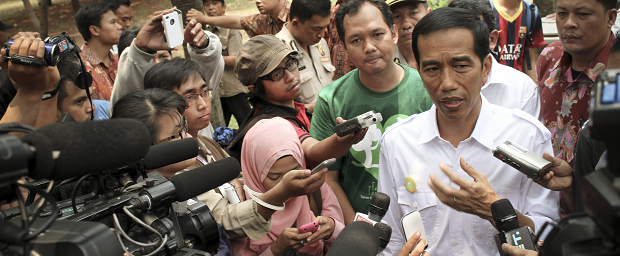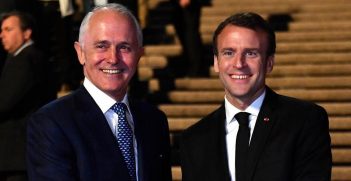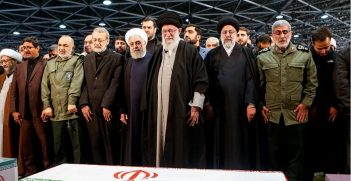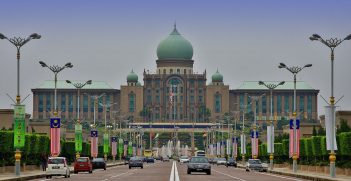Indonesia's Legislative Elections: The Importance of Money and Personalities

The April parliamentary elections in Indonesia have attracted surprisingly little Australian media coverage, having been over-shadowed by the up-coming presidential elections in July. They are significant for what they reveal about the direction of Indonesian politics. Vote-buying and leadership, rather than policies and party identification, were key factors in determining the outcome.
The Election Process
The 9 April general election was the eleventh in Indonesia’s post-independence history and the fourth since the 1998 downfall of Soeharto’s regime. The scale and logistical challenges of the election were massive; about 187 million citizens registered to vote in more than 600,000 polling stations across the nation’s many thousands of islands. Four simultaneous elections were conducted for the national parliament (DPR), the Regional Representatives Council (DPD), and for both the provincial and district legislatures (DPRD). For this election an open-list proportional system was used in which voters could either pierce a party logo at the top of the ballot paper or the name of an individual candidate listed below or both.
Provisional Results
Reliable ‘quick count’ surveys indicate that of the 12 parties in the election, ten have cleared the 3.5% threshold to secure seats in the DPR. They are:
- Indonesian Democratic Party of Struggle (PDIP) – 19%
- Golkar – 15%
- Greater Indonesia Movement Party (Gerindra) – 12%
- Democrat Party (PD) – 9%
- National Awakening Party (PKB) – 9%
- National Mandate Party (PAN) – 7%
- Prosperous Justice Party (PKS) – 7%
- National Democratic Party (NasDem) – 6%
- United Development Party (PPP) – 6%
- People’s Conscience Party (Hanura) – 5%
The biggest surprise of the election was the poorer than expected performance of former president Megawati Sukarnoputri’s PDIP. The party had nominated Jokowi, who is by far the most popular politician in the country for president just before the start of the campaign. Many polls and pundits had forecast that PDIP’s vote would exceed 25%, giving it a substantial lead over other parties and a clear advantage in any future coalition negotiations. But with only a modest lead over Golkar and Gerindra, PDIP was denied a commanding position.
PDIP’s failure to gain above 20% of the vote has direct consequences for the 9 July presidential election and the cabinet formation that will be finalised in October. The threshold for nominating a presidential candidate is 20% of the seats in the new national parliament or 25% of the national vote. As PDIP will fall short of the threshold it will need the support of one or more other parties formally to nominate Jokowi and his running mate.
The Decline of SBY’s Democrats
Less surprising in this election was the sharp fall in the vote for President Susilo Bambang Yudhoyono’s (SBY) Democrat Party. PD was the largest party in 2009 with 21% of the vote but the last two years have been calamitous for PD. A succession of corruption scandals have seen numerous senior figures forced to resign from their positions. SBY’s own standing has fallen as his party’s woes have deepened. Not only is he seen as an increasingly ineffectual president, he is also viewed as failing to keep order within his party.
A More Even Spread and More Money Politics
One of the notable features of this election was the relative evenness of the votes between parties compared to previous elections. In 1999, the top three parties won more than 68% of the vote and the leading party gained 35%; this year the top-three figure was 45% and the highest ranked party got below 20%. One practical outcome from this more even spread of votes is that governing coalitions need to include more parties to ensure a healthy parliamentary majority. The downside is that the more diverse the coalition membership, the less discipline and coherence the government is likely to have.
There are several reasons for this drop in support for major parties. To begin, voter volatility has increased and loyalty to parties has fallen sharply over the past 15 years. In 1999, survey data suggested that more than 80% of voters strongly identified with a particular party; in 2014 this figure was down below 20%. Furthermore, the change to an open list proportional electoral system in 2009 has also seriously undermined the position of parties. This system allows voters to choose individual candidates, rather than a party, and provisional results suggest about 60% of ballot papers were marked for candidates and only 40% for parties. Importantly, candidates from the same party are now competing against each other as much as against candidates from other parties. In short, Indonesian politics is increasingly driven by personalities than by party machines.
The open proportional system has had another major impact on Indonesian politics: it has generated unprecedented monetisation of elections. Candidates usually need vast sums of money to have a chance of success. Researchers regard the level of money politics in the 2014 election as unprecedented and that vote buying was a major factor in deciding elector behaviour.
The Presidential Elections and Relations with Australia
The legislative elections have made the presidential election a little less predictable than many pundits were expecting. Jokowi would appear to have an almost unassailable lead in the polls over his nearest rival, Prabowo Subianto from Gerindra, but PDIP’s disappointing performance on 9 April has complicated Jokowi’s preparations. Prospective coalition partners now feel that they can make stronger demands in return for their support. There are also tensions between Jokowi and PDIP over who should control the presidential election campaign and determine membership of a new cabinet.
Australia, like many other neighbouring countries, has followed the political developments in Indonesia closely. The clear preference of Australian officials is for Jokowi rather than Prabowo. Although Prabowo has made a concerted effort to persuade foreign governments that he would be a responsible head of state, his lamentable human rights record and combustible temperament make him a risky presidential prospect for Australia. Jokowi has little experience in international affairs and is more overtly nationalistic on economic issues than SBY. But he is also pragmatic and quick to learn, and would likely prove an amenable president on regional issues. If Jokowi is elected president later this year, the Abbott Government will be relieved, but it may well still find the new Indonesian Government less forgiving of any Australian missteps than its predecessor has been.
Greg Fealy is an Associate Professor of Indonesian Politics in the Department of Political and Social Change, The Australian National University.
A longer version of this article will appear in an AIIA Policy Commentary to be published in May.





